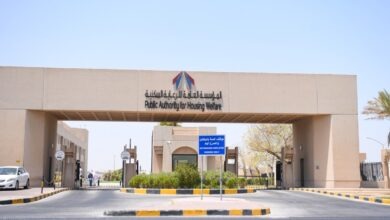IMF highlights Central Bank of Kuwait’s success in managing financial risks
The IMF mission noted a gradual easing of the pandemic-related credit slowdown and emphasized that macro-prudential policies effectively managed systemic risks and that the dinar’s exchange rate system has helped keep inflation low and stable.

• The IMF mission indicated that Kuwait’s economic recovery has slowed, with the country’s real GDP contracting by 3.6 percent in 2023. It is projected that the contraction will ease slightly to 3.2 percent in 2024.
• Stress tests conducted by the Central Bank of Kuwait showed that the liquidity and capitalization ratios of the sector exceeded the minimum requirements of Basel III, while non-performing loan rates remained low.
• The IMF mission welcomed the government’s plan to expand corporate income tax to include all major local companies, considering that having a medium-term framework for public finance and the macro economy enhances the government’s ability to analyze and forecast fiscal policy.
The Central Bank of Kuwait has announced the conclusion of the International Monetary Fund (IMF) experts’ mission to the country, part of the annual consultations. The mission indicated that Kuwait’s economic recovery has slowed, with the country’s real gross domestic product (GDP) contracting by 3.6 percent in 2023. It is projected that the contraction will ease slightly to 3.2 percent in 2024, according to reports from Al Rai newspaper.
The Central Bank stated in a press release that the mission’s visit to the country from September 24 to October 8 is part of the periodic consultations for 2024 under Article IV of the Fund’s Establishment Agreement.
According to the IMF’s experts, real GDP recorded a contraction of 3.6 percent in 2023, with the oil sector contracting by 4.3 percent, while the non-oil sectors saw a contraction of 1 percent. This was driven by lower oil prices and production quantities, as well as a decline in industrial activity in the refining sectors.
The mission expects real GDP to contract by 3.2 percent this year due to an additional reduction in oil production as part of the OPEC Plus decision, although the initial recovery of non-oil sectors is projected to continue with a growth rate of 1.3 percent this year despite fiscal consolidation measures.
Regarding local price levels, the mission reported that the annual inflation rate declined to 3.6 percent last year, attributed to a decrease in core inflation and food prices. They noted a significant decline in the inflation rate in recent months, reaching 2.9 percent last August due to lower prices in housing and transportation.
Annual inflation rates declining
The mission expects annual inflation rates to continue declining, reaching three percent this year due to reduced pressures on demand and falling prices of imported foodstuffs.
Regarding internal and external balances, the Fund’s experts indicated that these have declined over the past year as a result of lower oil prices and production quantities. The budget balance shifted from a financial surplus of 11.7 percent of GDP in the fiscal year 2022/2023 to a deficit of 3.1 percent in 2023/2024.
The mission attributed this mainly to a 5.8 percent decline in oil revenues, driven by lower oil prices and production quantities, alongside a 9.7 percent increase in current spending. They indicated that the public sector wage bill and government subsidies constitute approximately 5.7 percent and 3.4 percent of GDP, respectively.
The current account surplus narrowed to about 31.4 percent of GDP in 2023, with the trade balance surplus for goods and services declining by 10.3 percent of GDP due to lower oil prices and quantities. This was offset by a 7.4 percent increase in the income balance surplus.
Strength and resilience of the Kuwaiti banking sector
The IMF confirmed the strength and resilience of the Kuwaiti banking sector due to the Central Bank’s prudent regulatory requirements regarding lending operations and provision building. Stress tests conducted by the Central Bank showed that the liquidity and capitalization ratios of the sector exceeded the minimum requirements of Basel III, while non-performing loan rates remained low.
The Fund’s experts praised the Central Bank’s prudence in containing and managing systemic risks, noting that the credit slowdown resulting from the pandemic has begun to gradually decline. They stated that the macro-prudential policy was appropriately aligned with the containment of systemic risks and weak credit growth.
The experts emphasized that the exchange rate system of the dinar, which is linked to an undisclosed basket of currencies, serves as a solid pillar for monetary policy. They indicated that this system has contributed to keeping inflation low and stable for several years. Maintaining this successful record of monetary policy requires upholding the independence of the Central Bank.
They noted that the Central Bank’s approach to monetary policy was suitable for local economic conditions, and that the exchange rate system provides relative flexibility for monetary policy. The current interest rate is aligned with efforts to contain inflation and stabilize the output of non-oil sectors.
Kuwaiti economy exposed to global risks
The IMF experts noted that the Kuwaiti economy is exposed to various global risks due to its dependence on oil, particularly fluctuations in commodity prices, changes in global growth, and the exacerbation of regional conflicts. They explained that these risks affect the economy by impacting oil prices and production quantities.
They stated, “Local risks are mainly related to the extent of implementing financial and structural reforms. These reforms are necessary to diversify the economy away from oil, which will enhance its flexibility and stimulate private investment.”
Regarding financial reforms, the Fund’s experts mentioned that the Kuwaiti authorities are eager to implement changes to support the transition to a dynamic and diversified economy. To achieve this goal, “there is a need to significantly adjust public finances on both the public spending and non-oil revenue sides.”
They added, “Reducing current spending requires rationalizing the public sector wage bill and gradually eliminating large energy subsidies, replacing them with targeted subsidies for the most vulnerable groups. To increase non-oil revenues, a value-added tax and a selective goods tax should be introduced.”
The mission welcomed the government’s plan to expand corporate income tax to include all major local companies, considering that having a medium-term framework for public finance and the macroeconomyenhances the government’s ability to analyze and forecast fiscal policy. This includes establishing a framework for fiscal rules with a ceiling on public debt and a target for the general budget balance for non-oil sectors.
They stated that public finance must be supported by issuing a law for liquidity and government financing as soon as possible, emphasizing that enhancing economic diversification requires major reforms in the labor market.
Kuwaitis encouraged to seek employment in the private sector
The IMF mission explained that to encourage Kuwaitis to seek employment in the private sector, compensation and working conditions should be more aligned between the public and private sectors. They indicated that improving the quality of education and aligning it with the needs of the private sector would enhance productivity and support economic diversification.
The statement noted that the Fund’s experts stressed the importance of having statistical data available and not delaying its release in the process of making and analyzing policies. They pointed out the delay in issuing national accounts data for spending in 2023 and urged the authorities “to urgently support the efforts of the Central Statistical Administration to enhance its capacity and resume the annual survey of establishments,” in addition to improving government finance statistics and the international investment position statistics.
Figures and indicators show a 3.6% contraction in real GDP for 2023, with an expected contraction of 3.2% this year. Additionally, there is a 3.4% contraction in the oil sector and one other sector, while the current account surplus of GDP for 2023 stands at 31.4%. Furthermore, there is a 5.8% decrease in oil revenues as a percentage of GDP.












